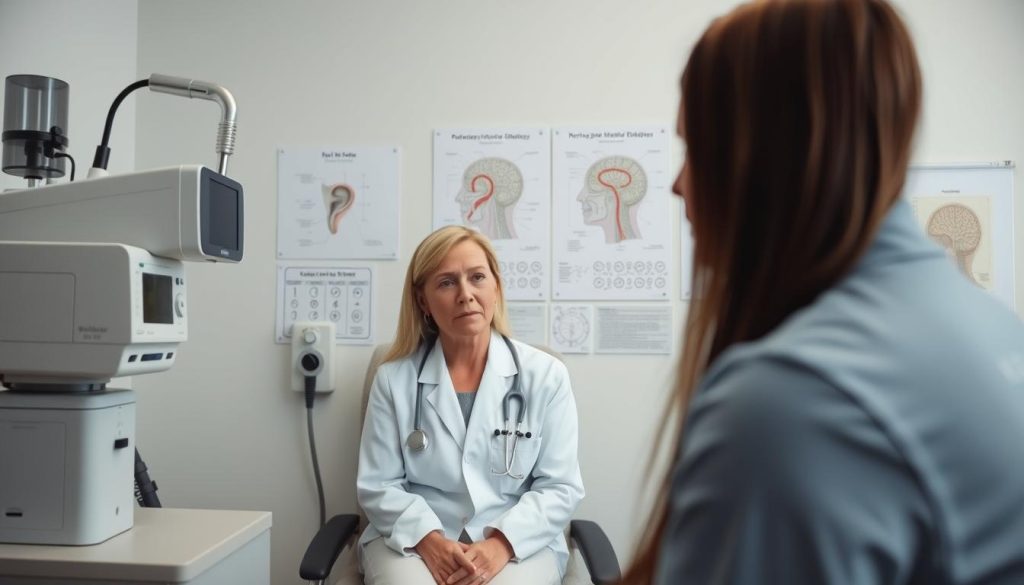Vertigo can make your world spin out of control. It affects millions, making everyday tasks hard. Knowing what causes vertigo is key for those looking for relief.
Vertigo can stem from inner ear problems or neurological issues. These are just a few of the many reasons why vertigo happens.
Things like medical conditions, certain environments, and lifestyle choices can trigger vertigo. Knowing these triggers helps manage and prevent vertigo episodes. Symptoms include feeling like you’re spinning and nausea, affecting daily life.
By understanding vertigo causes and symptoms, we can tackle this disorienting condition better.
Understanding Vertigo: Definition and Basic Concepts
Vertigo is a feeling of spinning that makes you feel off-balance. It’s different from dizziness. Vertigo comes from problems in the inner ear or brain. These issues can cause various sensations and affect daily life.
Difference Between Vertigo and Dizziness
Dizziness is a general feeling of being unsteady. But vertigo feels like the room is spinning. People with vertigo might feel like they’re tilting or moving, even when they’re still. Knowing the difference is important for getting the right treatment.
Types of Vertigo Sensations
Vertigo can show up in different ways:
- Spinning sensation
- Feeling of being pulled to one side
- Swaying or rocking, as if on a boat
- Lightheadedness or floating feeling
Impact on Daily Life Activities
Vertigo can make everyday tasks hard. Simple things like getting out of bed or walking can be tough. Some people also get nausea or vomit during episodes. Work and social life can suffer because of unpredictable vertigo attacks. Understanding these effects is crucial for managing vertigo well.
“Living with vertigo is like trying to navigate a world that won’t stop moving.”
What Causes Vertigo: Primary Medical Conditions
Vertigo comes from many medical issues affecting different parts of the body. Knowing what causes vertigo helps find the main problem and plan the right treatment. Inner ear problems are a big reason for vertigo, messing with our balance.
Neurological problems can also cause vertigo. Issues like brain tumors, strokes, or multiple sclerosis can mess up how the brain handles balance signals. These need careful medical checks and special care.
Other health issues can also lead to vertigo. This includes heart problems, hormonal imbalances, and some medicines. For example, migraines often come with vertigo in some people.
| Vertigo Source | Common Symptoms | Typical Duration |
|---|---|---|
| BPPV | Spinning sensation with head movement | Seconds to minutes |
| Meniere’s Disease | Vertigo with hearing loss and tinnitus | 20 minutes to several hours |
| Vestibular Neuritis | Sudden, severe vertigo with nausea | Days to weeks |
| Migraine-Associated Vertigo | Vertigo with headache and light sensitivity | Hours to days |
Finding out what really causes vertigo is key to treating it well. Doctors use tests like physical exams, imaging, and balance tests to figure out the cause. Then, they can plan the best treatment.
Inner Ear Disorders as Vertigo Triggers
Inner ear problems are a big reason for vertigo. Knowing what causes vertigo often points to our ears. Let’s look at four common inner ear disorders that can cause this feeling of being off-balance.
Benign Paroxysmal Positional Vertigo (BPPV)
BPPV happens when tiny calcium crystals in the inner ear move out of place. This movement causes short but strong vertigo episodes, usually when we move our heads.
Meniere’s Disease
Meniere’s disease is when fluid builds up in the inner ear. It can lead to long vertigo attacks, hearing loss, and ringing in the ears.

Vestibular Neuritis
Vestibular neuritis is when the vestibular nerve gets inflamed. It causes sudden, severe vertigo that can last for days. It often comes with nausea and trouble balancing.
Labyrinthitis
Labyrinthitis is inflammation of the inner ear’s labyrinth. It causes vertigo, hearing loss, and ringing in the ears. It’s often caused by viruses.
| Disorder | Main Symptoms | Duration |
|---|---|---|
| BPPV | Brief vertigo with head movements | Seconds to minutes |
| Meniere’s Disease | Vertigo, hearing loss, tinnitus | 20 minutes to several hours |
| Vestibular Neuritis | Sudden severe vertigo, nausea | Days to weeks |
| Labyrinthitis | Vertigo, hearing loss, tinnitus | Days to weeks |
Knowing about these inner ear disorders helps us understand vertigo. If you keep feeling off-balance, see a doctor for help.
Neurological Factors Contributing to Vertigo
Vertigo often comes from problems in the brain’s balance centers. These issues can make it hard to process sensory information. This leads to intense dizzy spells.
Migraines are a big cause of vertigo. Many people with migraines feel dizzy before, during, or after their headaches. This is called vestibular migraine and can happen without any pain.
Multiple sclerosis (MS) is another condition that can cause vertigo. MS damages the protective coating around nerve fibers. This can affect balance and spatial orientation, leading to recurring vertigo.
Brain tumors are less common but serious. Tumors near balance or hearing areas can cause vertigo. Symptoms include:
- Persistent dizziness
- Difficulty walking straight
- Nausea and vomiting
- Changes in vision or hearing
Strokes in the brainstem or cerebellum can also cause sudden vertigo. This vertigo is often severe and comes with other symptoms like facial numbness or trouble speaking.
Knowing about these vertigo causes is key for getting the right treatment. If you keep getting dizzy, especially with other symptoms, see a doctor for help.
Environmental and Lifestyle Triggers
Understanding vertigo root causes means looking at many environmental and lifestyle factors. These can greatly affect when and how bad vertigo episodes are. This makes everyday life hard for those who have it.
Motion Sensitivity
Motion sensitivity is a big reason for vertigo. It can make people feel dizzy and sick during car rides, at amusement parks, or watching fast images on screens. The brain has trouble sorting out all the sensory info, causing vertigo symptoms.
Visual Triggers
Some people get vertigo from visual stuff. Bright lights, repeating patterns, or scrolling on digital devices can make them feel off-balance. It’s about how the brain handles visual and balance signals.
Stress and Anxiety
Stress and anxiety really affect vertigo. High stress can tighten neck and shoulder muscles, messing with balance. Anxiety can make vertigo symptoms worse, starting a cycle of worry and discomfort.
| Trigger | Description | Management Tips |
|---|---|---|
| Motion Sensitivity | Dizziness during travel or movement | Sit in stable positions, focus on fixed points |
| Visual Stimuli | Discomfort from patterns or lights | Use blue light filters, take screen breaks |
| Stress and Anxiety | Increased vertigo due to tension | Practice relaxation techniques, seek therapy |
It’s key to know these environmental and lifestyle triggers to manage vertigo well. By figuring out what triggers vertigo for them, people can take steps to reduce episodes. This can greatly improve their life quality.
Recognizing Common Vertigo Symptoms
It’s important to know the signs of vertigo to find its cause and get the right treatment. Vertigo can come from different sources, but its symptoms are often similar. Let’s look at the physical signs, other symptoms, and when to seek emergency help.
Physical Symptoms
The main sign of vertigo is feeling like you’re spinning. This can happen for many reasons. You might also feel:
- Loss of balance
- Nausea and vomiting
- Sweating
- Headaches
Associated Symptoms
Vertigo can also bring other symptoms, depending on the cause. These might include:
- Ringing in the ears (tinnitus)
- Hearing loss
- Vision problems
- Difficulty concentrating
These symptoms can make everyday tasks hard. Knowing them is key to spotting and treating health problems right.
Emergency Warning Signs
Even though most vertigo isn’t serious, some signs need quick medical help. Watch out for:
- Sudden, severe headache
- Chest pain or trouble breathing
- Numbness or weakness on one side of the body
- Slurred speech
- Fainting or loss of consciousness
These could mean serious problems like a stroke or heart issue. Seeing a doctor fast is vital to check for serious issues and get the right care.
Age-Related Vertigo Factors
As we get older, our bodies change in ways that can affect our balance. This makes us more likely to experience vertigo. It’s important to know about these changes to manage and prevent vertigo.
One big factor is the loss of hair cells in the inner ear. These tiny cells help us stay balanced. When they decline, we become more prone to dizziness and spinning.
Another change is less blood flow to the inner ear and brain. This can mess up the vestibular system, causing vertigo. Older adults also might have slower nerve signals, making balance harder.
“Age-related changes in the vestibular system can make older adults more prone to vertigo, but it’s not an inevitable part of aging.”
Medical conditions like high blood pressure and diabetes are also common in older adults. They can affect blood flow and nerve function, leading to vertigo.
Even though age can raise vertigo risk, staying active and doing balance exercises helps. Regular health check-ups are also key. Knowing about these factors helps older adults manage their health better.
Medication and Treatment-Induced Vertigo
Some medicines and treatments can cause vertigo. This makes it harder to figure out what causes it. Drugs meant for other health issues might make you dizzy and affect your balance.
Common Medications Causing Vertigo
Many drugs can lead to vertigo. These include:
- Antidepressants
- Blood pressure medications
- Anti-seizure drugs
- Some antibiotics
Talking to your doctor about side effects is key when starting new meds. Just like some drugs cause acid reflux, others can make you feel dizzy.
Treatment Side Effects
Some treatments can cause vertigo too. For instance, chemotherapy or radiation therapy can mess with your inner ear. This can make it hard to balance.
Surgeries, especially in the head or neck area, might also cause vertigo after the operation.
Drug Interactions
When different drugs mix, they can sometimes cause vertigo. It’s vital to tell your doctor about all the meds you’re taking. This includes over-the-counter drugs and supplements.
| Drug Class | Potential Vertigo Risk | Common Examples |
|---|---|---|
| Antidepressants | Moderate | SSRIs, SNRIs |
| Blood Pressure Meds | High | Beta-blockers, ACE inhibitors |
| Antibiotics | Low to Moderate | Aminoglycosides |
| Anti-seizure Drugs | Moderate | Carbamazepine, Valproic acid |
Diagnostic Approaches for Vertigo
Finding the cause of vertigo needs a detailed plan. Doctors use many methods to find out what’s causing your vertigo. These steps help find the main problem.

Physical exams are key in finding vertigo. Your doctor might do the Dix-Hallpike test. This test moves your head and body to see if it triggers symptoms. It helps figure out if you have Benign Paroxysmal Positional Vertigo (BPPV).
Imaging tests give important clues about vertigo. MRI and CT scans show if there are problems in your brain or inner ear. These tests are great when you think it might be a neurological issue.
Tests for balance and hearing are also important. Electronystagmography (ENG) checks how your eyes move to see if your inner ear is working right. Audiometry tests your hearing, which can be affected by vertigo.
| Diagnostic Test | Purpose |
|---|---|
| Dix-Hallpike Test | Identify BPPV |
| MRI/CT Scans | Detect structural abnormalities |
| Electronystagmography | Assess inner ear function |
| Audiometry | Evaluate hearing ability |
Your doctor will also look at your medical history and what medicines you’re taking. This detailed approach helps find the right diagnosis and treatment for you.
Prevention Strategies and Management Techniques
Managing vertigo requires several strategies to lessen its impact. Knowing what causes vertigo helps in finding effective prevention methods. Let’s look at some key techniques to fight vertigo.
Lifestyle Modifications
Making simple changes in your routine can greatly help. Avoid sudden head movements and ensure you get enough sleep. These actions can reduce vertigo episodes caused by common vertigo origins.
Exercise and Physical Therapy
Specific exercises can improve balance and lessen vertigo symptoms. The Epley maneuver, for example, is excellent for BPPV. Regular physical therapy strengthens your vestibular system, tackling vertigo at its source.
Dietary Considerations
What you eat can impact vertigo. Reduce salt, caffeine, and alcohol intake. These steps can help manage Meniere’s disease, a known vertigo trigger. Stay hydrated to support your inner ear function.
Stress Management
Stress can make vertigo symptoms worse. Try relaxation techniques like deep breathing or yoga. These practices ease stress and may reduce vertigo attacks. Remember, managing stress is crucial in addressing many vertigo root causes.
FAQ
Q: What is the difference between vertigo and dizziness?
A: Vertigo is a type of dizziness where you feel like you’re spinning. It’s like the world around you is moving. Dizziness is a broader term. It can make you feel lightheaded or unsteady, but without the spinning feeling.
Q: What are the most common causes of vertigo?
A: Vertigo often comes from problems in the inner ear. This includes Benign Paroxysmal Positional Vertigo (BPPV) and Meniere’s Disease. It can also be caused by neurological issues, environmental factors, and some medicines.
Q: How does BPPV cause vertigo?
A: BPPV happens when tiny crystals in the inner ear move. They get into the semicircular canals. This messes up how the ear senses head position, sending wrong signals to the brain and causing vertigo.
Q: Can migraines trigger vertigo?
A: Yes, migraines can lead to vertigo in some people. This is called vestibular migraine or migraine-associated vertigo. It can cause vertigo episodes, with or without a headache.
Q: Are there any environmental factors that can trigger vertigo?
A: Yes, things like being in a moving vehicle can trigger vertigo. So can watching fast-moving objects or scrolling on screens. Stress or anxiety can also cause it.
Q: What are the emergency warning signs associated with vertigo?
A: Look out for sudden severe headache, chest pain, or trouble breathing. Also, numbness, weakness, slurred speech, or losing consciousness with vertigo is a warning sign. Seek help right away if you see these symptoms.
Q: Can aging increase the risk of experiencing vertigo?
A: Yes, getting older can make you more likely to have vertigo. This is because the inner ear and balance systems change with age. Older adults might be more prone to BPPV and balance issues that cause vertigo.
Q: What types of medications can cause vertigo?
A: Some medicines can cause or make vertigo worse. This includes certain antibiotics, antidepressants, blood pressure meds, and anti-seizure drugs. Always talk to your doctor about possible side effects of your meds.
Q: How is vertigo diagnosed?
A: Doctors use physical exams, medical history, and special tests to diagnose vertigo. They might do the Dix-Hallpike test for BPPV, eye movement tests like ENG, or imaging like MRI or CT scans for neurological causes.
Q: Are there any exercises that can help manage vertigo?
A: Yes, there are exercises for vertigo, especially for BPPV. The Epley maneuver and Brandt-Daroff exercises are often suggested. Vestibular rehabilitation therapy can also help improve balance and reduce vertigo symptoms.

















